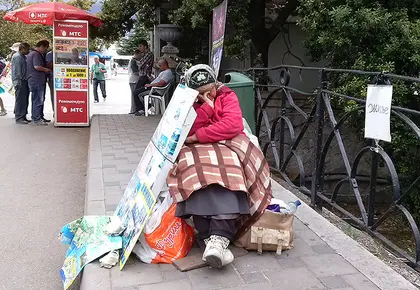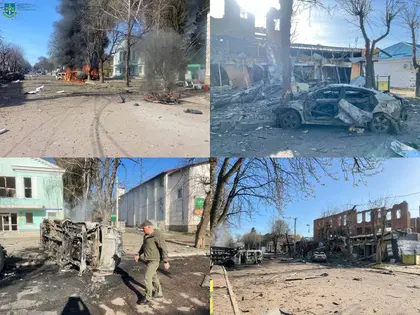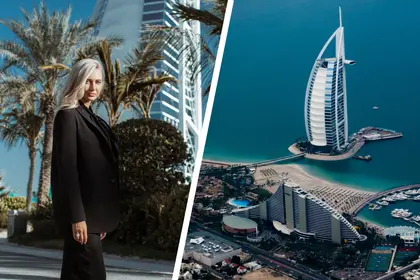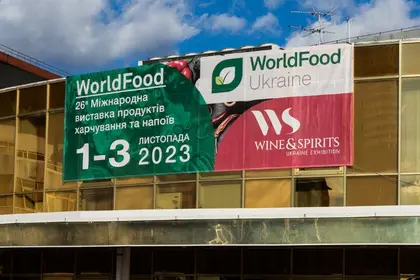SIMFEROPOL, Crimea – By this time, Simferopol railway station should be bustling with tourists hauling summer holiday luggage. Yet, it is remarkably empty.
The mini-bus to the seaside resort of Yalta was half empty, and the few people on it were all locals. The winding road that climbs over the Angarsky pass to the coast was largely free of traffic. Billboards along the route showed forlorn, tatty advertisements for Ukrainian firms that don’t exist anymore in Crimea, or airlines that no longer fly here. About every fourth billboard was a poster urging people to vote in a referendum to join Russia that took place nearly three months ago.
On arriving in Yalta, the cafe of a smart hotel in a prime location near the seaside was closed.
“There you go: your first indication of how the tourist business is going this year,” said Ihor Brudny, the tour firm owner who had arranged a meeting here, with a resigned shrug.
Early June is usually a busy and hopeful time for Crimeans.
Half of the peninsula’s two million people make their living from tourism. And now they should be gearing up for floods of visitors – 6 million last year – who flock to the beaches and mountains from June to August, bringing their Ukrainian hryvnias, Russian rubles and, increasingly, dollars and euros.
This year, the Russian takeover of Crimea after a sham referendum in March that most the world didn’t recognize, has turned this world upside-down.
Teachers are back at school for a month, having to study for new accreditation in the Russian education system. Advertising agents are sitting in empty offices, pondering the loss of Ukrainian and international clients unable to work here, or hard-hit local firms who can’t afford their services anymore. Accountants and lawyers are attending a bewildering array of seminars on how to adapt to the Russian legal system. Many farmers, deprived of their water supply from Ukraine, have lost their crops, or – if they were lucky – did not plant at all. Tourist industry workers, from taxi drivers to translators, restaurant owners to souvenir sellers, are facing a deficit of clients and a multiplication of difficulties.
Take Brudny, who has run a tourist agency in Yalta since 1992. In recent years Ukrainians made up 70 percent of total tourists to Crimea, according to the Crimean Resorts and Tourism Ministry, and Russians comprised 25 percent. This year, Ukrainians horrified by Russian occupation and worried about transport problems, are not coming. Westerners also aren’t expected because of travel warnings and visa uncertainties.
“No foreigners, no Ukrainians: no work,” said Brudny. That means no work too for the drivers, guides and translators he employs. His account, in Ukrainian-owned Privatbank controlled by Dnipropetrovsk Governor Ihor Kolomoisky, was frozen in March. With no money, agents like himself can’t pay to rent offices. In order to attract new clientele, Brudny should already be advertising in tourist brochures for next year. With no income and no certainty for the future, he can’t even think about that investment.
So far this year, Brudny is expecting one solitary British tourist with an unusual itinerary that includes Chornobyl and Transnistria, the unrecognized breakaway region of Moldova. “As far as foreigners go, only extreme tourists want to come here now,” he said.
Russian and Crimean ministers are issuing contradictory statements on the tourism situation and just about everything else in Crimea.
On June 11, Kremlin-backed Crimean government head Sergei Aksyonov wrote on his Facebook page that the flow of Russian tourists was “exceeding our expectations.”
Yet, at the beginning of June, Crimean Tourism Minister Yelena Yurchenko said that resorts were just 37 percent full. Many Crimeans looking at empty restaurants, hotels and beaches can only conclude that Aksyonov’s expectations must be exceedingly low.
Since hardly any nation recognizes Russia’s land grab, Crimean air and sea space is closed to international traffic: No flights except from Russia, no shipping and no cruises, which made up a large part of Crimean tourism.

Around 130 cruises used to visit Sevastopol annually; this year the city has lost 37,000 cruise ship tourists, according to the Sevastopol administration tourism department. Meanwhile small businesses that make a living selling imported goods and souvenirs have to import via the Russian port of Novorossiysk, adding time and money. To compound their difficulties, recently police and self-defence militias have forcibly taken down souvenir kiosks from the sea front in Sevastopol and Yevpatoria, citing Russian legislation.
Since Russia has reduced taxes on flights from Russia to Crimea, there are now several cheap airlines flying to Simferopol. But air traffic cannot begin to make up for the flow that used to come overland. Most trains that connect Russian cities in summertime with Crimea via Ukraine are not running this year. Meanwhile, with Russian news full of images of war and havoc, many Russians are too afraid to venture across Ukrainian territory anyway.
The new border between the Ukrainian mainland and Crimea is unpredictable, with some passengers reporting delays of up to 12 hours.
Russia has introduced a combined train-bus-ferry-bus ticket for travelers entering Crimea by ferry from Russia’s Krasnodar region to Kerch, in Crimea’s remote southeastern corner. But it is hardly convenient. Yegor Shupikov, whose Yalta tourist agency has many long-term Russian clients, said one of his regular groups from Russia had cancelled this year because of the inconvenience of travelling via Kerch.
Money is another problem. Ukrainian and international banks have closed their Crimean branches, and while some smaller Russian banks are now opening in their place, Crimean businesses cannot accept payments by card or bank transfer, making booking services impossible. To further complicate matters, Crimea switched to the Russian ruble on June 1. That meant Yalta tourism agency Viza had to turn down some potential clients from Donetsk last week, since they wanted to pay by transfer in Ukrainian hryvnia.
Nevertheless Viza director Vitaly Zakhodyakin is a man determined to find a silver lining.
He used to get up to 15 coach-loads of Russians visiting for the May holidays. No organized groups visited this year. But the individuals that are coming have booked more extended tours. “They forgot Crimea, and want to get reacquainted,” he said.
Ukrainians, who made up the majority of his business, are not coming since “some…are offended that Crimea became Russian.” But he is building new contacts with Russian partners instead. “They are ready to work with us in Russia, but there is some kind of delay,” he said.
Meanwhile some of Zakhodyakin’s Crimean clients are finding it difficult to book overseas trips. Crimeans cannot get European visas with their new Russian passports, since Europe does not recognize Crimea as Russian.
If that weren’t enough, clients are cancelling for financial reasons – with no Crimean tourist season this year, they will not be able to afford the foreign holiday they had booked.
Nevertheless, Zakhodyakin remains optimistic. “Life is going on, and sorting itself out,” he said. “This is just the transition period, which I don’t think can last a long time.”
The phrase “transition period” is heard everywhere in Crimea. It is the explanation for every problem, from paying or receiving a salary (difficult without banks) to paying taxes (firms were told they had a tax holiday from February to April, only to find out in May that they were expected to pay taxes in full, according to Ukrainian law, but to the Crimean government); from buying dairy products (banned from Ukraine for a period) to buying medicine, which has risen in price up to four times in the last two months.
How long this transition period lasts is anyone’s guess.
Officially, Russian legislation comes into effect on the peninsula on Jan. 1. In practice, says Simferopol lawyer Teifuk Gafarov, both civil and criminal Russian law is already in effect.
All businesses and organizations are required to close down and re-register as Russian or Crimean businesses by the end of the year, but many have little idea how exactly to do this. “We’ve opened a new account, and I think it will happen automatically,” said Shupikov from the Yalta tourist agency. “But we’ve been told that …we have to start again from zero.”
Other firms have used the opportunity to lay off staff, or to only rehire those with Russian passports, say lawyers.
To help Crimeans overcome the “transition period,” Russian consultants and businesses have flocked to Crimea, offering seminars and training courses. That means that for hotel owners in Sevastopol and Simferopol at least, business is booming, with rooms completely booked by Russians in search of new business opportunities.
As Shupikov and the rest of Crimea wait out the “transition period,” their lives and businesses seem as frozen as Shupikov’s prices, which despite the higher cost for many food products, medicines, and transport, he has not increased this year.
“If we raise prices our clients won’t come,” said Shupikov, whose remaining clientele mostly comes from conflict-stricken eastern Ukraine. “What’s most important is not to make a profit, but to retain our remaining clients.”
Coupled with low prices, Shupikov can also offer an exceptionally high-quality vacation.
“There will be fewer tourists, but on the other hand, the beaches will be empty, the quality of service will be amazing, our local inhabitants and hotel workers will start to value every client, they will carry them in their arms,” he said. ‘”You know what they say, for every evil there is always something good.”
Editor’s Note: This article has been produced with support from www.mymedia.org.ua, funded by the Ministry of Foreign Affairs of Denmark and implemented by a joint venture between NIRAS and BBC Media Action. The content is independent of these organizations and is solely the responsibility of the Kyiv Post.
You can also highlight the text and press Ctrl + Enter








Comments (0)